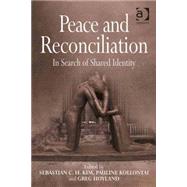
Note: Supplemental materials are not guaranteed with Rental or Used book purchases.
Purchase Benefits
What is included with this book?
| Introduction, Sebastian C.H. Kim | |
| Establishing a shared identity: the role of the healing of memories and of narrative | |
| What does common identity cost? Some German experiences and provocative questions | |
| Truth and reconciliation: and interfaith perspective from India | |
| Peace and reconciliation: Biblical themes in the East Asian context | |
| Religion as a tool for waging peace: theoretical perspectives in the context of Bosnia-Herzogovina | |
| Embracing a threatening other: identity and reconciliation in Northern Ireland | |
| Towards reconciliation and justice in South Africa: can church unity make a difference? | |
| Korean War: the origin of the axis of evil in the Korean peninsula | |
| Towards peace and reconciliation between South and North Korean churches: contextual analysis of the 2 churches | |
| Strategies for peace and reunification in Korea | |
| Reconciliation possible? The churches' efforts toward the peace and reunification of North and South Korea | |
| Appendices | |
| Index | |
| Table of Contents provided by Publisher. All Rights Reserved. |
The New copy of this book will include any supplemental materials advertised. Please check the title of the book to determine if it should include any access cards, study guides, lab manuals, CDs, etc.
The Used, Rental and eBook copies of this book are not guaranteed to include any supplemental materials. Typically, only the book itself is included. This is true even if the title states it includes any access cards, study guides, lab manuals, CDs, etc.